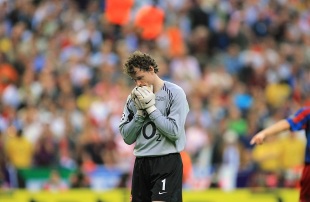- Premier League
Thanks for standing by me

Arsene Wenger has always been different to most managers, possessing a professorial intelligence and appearing to be both polite and prickly - sometimes simultaneously.
So even as he looked forward to his 1,000th game in charge of Arsenal against Chelsea on Saturday, no-one should be surprised that a hint of a swipe at Chelsea, Manchester City and various others could be identified.
What has made him most proud in 18 years at the helm, he said, is that the club have stayed true to their "traditional values", that they have not bought success or forsaken an entertaining style in its pursuit.
But what Wenger showed, perhaps for the first time, was also a touch of the realism he has been criticised for lacking. For once he appeared ready to accept that Arsenal's failure to win a trophy since their 2005 FA Cup victory has sometimes required a leap of faith.
"You go step by step," Wenger said. "But I have to say it is an honour to manage a club of that dimension for such a long time. I thank everyone in the club for showing me the faith for so long."

Of course, with Wenger, his humility - and pride - was mixed with what could be interpreted as a jibe. He is a complex character.
"What we have achieved together is transforming this club in a modern way," he told Arsenal Player. "It is now a much bigger club that is respected and loved all over the world and everyone at the club has contributed to that.
"We have done that without losing respect for the traditional values of the club, respect of the people who built this club. I am very proud that we have done this."
Wenger has railed against the spending of Europe's biggest clubs and often called on UEFA to ensure its new Financial Fair Play rules have real teeth.
His outbursts may, as he clearly believes, have been motivated by his attachment to traditional values; Wenger is a manager who loves to add value to his club and his squad on the training ground and no big fan of buying success.
Yet it is hard to accept that his thoughts have not been shaped in any way by the circumstances he has found himself dealing with.
Wenger has managed Arsenal through their long transition period while they planned and raised money to move from Highbury to the Emirates Stadium, finally changing home grounds in 2006. His approach to team building was limited as a result.
Praying for The Professor to stay

- As Arsene Wenger approaches his 1,000th game in charge of Arsenal against Chelsea on Saturday, concerns are growing about his future, writes John Cross.
- Click here to continue reading
The club borrowed huge sums to fund the move, which cost more than £400 million in construction costs and interest, making an investment for the future off the pitch which had a serious knock-on effect on it.
They said repeatedly that Wenger had money to spend on the team despite their onerous financial commitments elsewhere, yet he remained parsimonious.
The manager slipped up occasionally, admitting that he had to sell players to balance the books, and fans lamented the departures of key figures such as Cesc Fabregas, Robin van Persie and Samir Nasri.
But it is not just the business side of the game and the way coaching fits in with it in the club jigsaw that is important to Wenger.
He is something of a traditionalist, too, in his view that teams should be there to entertain and few would grumble about the style his Arsenal teams have always played.
Some fans may have said they preferred the George Graham days of One-nil to the Arsenal when Wenger's teams have looked unlikely to make their attractive approach effective. A lack of silverware can do that.
But the Frenchman has won many admirers for Arsenal's style throughout the world and for that he can be rightly proud.
It will be the legacy he leaves when he eventually calls it quits; that and his unfaltering competitive spirit.
Even as Wenger spoke of celebrating the monumental landmark of 1,000 games on Thursday, he highlighted his disappointments and admitted to a refusal to relax for a moment.

He picked out his side's 2006 Champions League final against Barcelona as the biggest regret in his 999 games as manager.
Champions League success is the one void on Wenger's impressive record and that fateful night in Paris - when goalkeeper Jens Lehmann was sent-off just 18 minutes into the game at Stade de France against Frank Rijkaard's Barcelona - was revealed as the darkest moment in an extraordinary reign.
"I would like to replay the Champions League final with eleven men in 2006," Wenger said, remembering how his 10-man team took the lead before losing to late strikes from Samuel Eto'o and Juliano Belletti. "It will be the regret forever.
"It has happened to us again with Bayern [this season]. That game I would love to have seen what would have happened if we stayed 11 against 11 against Bayern. These were huge games with so much at stake and you feel you cannot play with all your cards."
Wenger has always seen clearly the wrongs he perceives have been done to his team (and his vision has been infamously poor when the boot is on the other foot).
But it has not stopped him enjoying his triumphs and he picked out the Champions League victory against Barcelona in 2011 as one of the highlights of his reign.
"It looks to me like I started yesterday," he added. "Where did the time go? I can't believe it is such a long time. You always focus on looking forward, but when you look back, you think I have made quite a distance here."
Leo Spall is Deputy Editor at ESPN UK

